In the days when there is so much talk in Ukraine about the major offensive that the enemy is about to launch, Ukrinform met with the deputy head of Ukraine’s defense intelligence, Major General Vadym Skibitskyi, to discuss the most pressing issues of today.
- General, how do you assess the recent changes in the Russian military leadership? What is it done for? Have the first consequences of Surovikin being replaced by Gerasimov already manifested themselves?
- In such a short period of time, it is still difficult to say how much the tactics have changed, but we definitely know that there will be changes. We can see how they are now moving, where their airborne troops are regrouping. This is Gerasimov's signature tactic. Why? Because at the outset of the full-scale aggression, we clearly knew that there were paratroopers in the second echelon, in fact, in the strategic reserve, in all directions, and in the offensive on Kyiv they generally performed the main task. We expect that even now there will be a more active use of airborne assault troops. Apparently, it was against this background that misunderstandings arose between Gerasimov and the commander of the airborne troops (Colonel General Mikhail Teplinsky during a meeting at the Russian General Staff cursed at Gerasimov, for which he was immediately dismissed – ed.) First of all, due to the fact that under Gerasimov’s command, almost half of the Russian airborne assault troops were eliminated over the first six months of the Great War in Ukraine. And these are elite troops: the 76th, 106th, and 98th divisions… By the way, the latter was transferred from the Kherson direction to other, more important one, according to their estimates.
- Could you share your assessment: what's next?
- There will be active fighting in the Donetsk and Luhansk directions. Gerasimov failed to fulfill the task set before him. The first is the complete occupation of Donetsk and Luhansk regions.
- Putin ordered them to take Donbas by March. It's a month and a half from now...
- Yes, there will be active fighting in February-March, and precisely in the Luhansk and Donetsk regions. We are still seeing the transfer of the 2nd Mechanized Division of the 1st Tank Army from Belarus. We do not rule out that they may again try to cross into our territory, this is the Kupiansk direction, it is also possible that they will resume offensive action with the aim of regaining control of the territories they had previously captured in Luhansk region...
- And what do you think about Andrei Illarionov's statement that they want to cut off Ukraine from Europe?
- Here I will say very simply. If we really evaluate these things, a powerful information campaign is being run against our state. They will stretch our forces, they will intimidate our population... Look at how many Russian analysts currently working abroad say there are 220,000 troops on the territory of Belarus, and just recently they said there were 150,000 deployed there... In fact, they’re not there. The grouping that exists now cannot be compared to what it was in February last year. It is necessary to understand that we are also ready. Combat readiness checks of the units defending the northern border of our state have been conducted there, the corresponding defensive lines have been prepared, the air defense system has been deployed and strengthened, including around Kyiv. And if we shoot down enemy cruise missiles now, believe me, shooting down helicopters and planes is much easier.
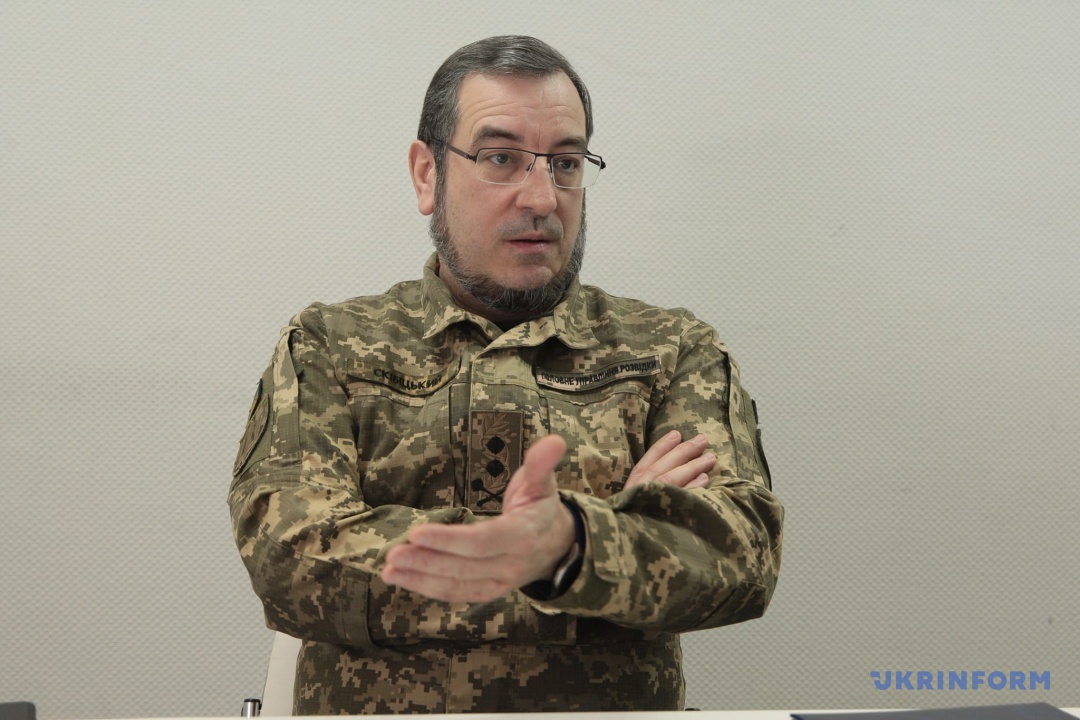
- But Illarionov again spoke about some attempts at encircling our troops from the north, from the south, a breakthrough to Lviv, the landing in Odesa region… He scared my wife a lot, as well as many other people...
- The plans for partial or complete encirclement of our troops in Donetsk and Luhansk directions they had from the very beginning, this was the first plan developed by Gerasimov himself during the invasion in February 2022. And what is the outcome? They have not yet been implemented.
- People now say more often that Russia should not be underestimated, and in particular, that the enemy is also learning, and these 11 months did not just pass by for them. Does intelligence see any concrete indications that this is the case? Did they learn any of their lessons?
- I would say more. Not just learning, they now began to more realistically assess our might.
- Already?
- Indeed. Then, in February, their convoys crossed in without any cover, without an organized anti-aircraft network, and we destroyed everything that was heading toward, right there as part as those convoys. Now they realized that no one would greet them with flowers here. The more we fight, the more they draw conclusions. They are now building a clearer command system along the entire front line, which we can clearly see. They change the tactics of employing their units. If a year ago it was Battalion Tactical Groups, now they have returned to the classic scheme - brigade, regiment, and battalion. They began to create assault units numbering 140-160 soldiers. Such detachments include mechanized units, tanks, artillery, mortars, and anti-tank systems – to break through in certain areas thanks to assault efforts. And also there’s the tactics pursued by Wagner PMC, which was used first in Bakhmut, then in Soledar. They are trying to carry out assault operations at the expense of delivering powerful artillery strikes to completely wipe out our defensive positions. And this goes wave after wave, despite the colossal human losses that they bear.
- Can this also be considered experience?
- Yes, this is their experience of conducting hostilities.
- And what about missile strikes?
- They make certain changes in the use of cruise missiles. Each time, you see, different launch lines, different warplane flight routes are chosen. They try to bypass our air defense system, they know in which areas it is strong and in which areas it is not so strong. These are all real examples that indeed, the enemy is learning. The longer the fighting lasts, the more experience the enemy gains. And the threat is that their freshly mobilized soldiers are already different from those who came to our territory in October.
- What will they never learn?
- They always wait for what the senior boss will tell them from above. And the second thing – they are too often ready to sell their lives for money. According to our intercepts, we are always surprised when a Russian soldier tells his wife that he will step on a mine here and get RUB 800,000 or so, at the same time he will return to Russia and not have to fight anymore. Or that he will fight, earn that much money, buy a car, pay off the loan, and save up for an apartment...
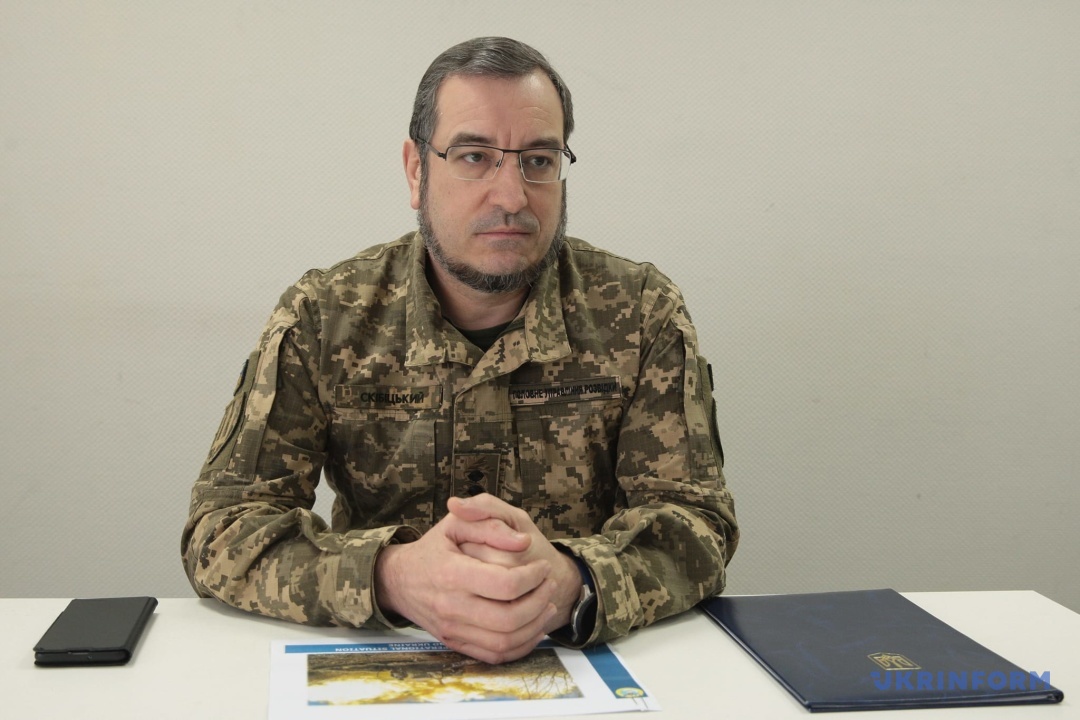
- Kyiv was recently shelled from the S-400 anti-aircraft complex. And we were immediately told that this shelling came from the north. Everyone thought that it was from the territory of Belarus. So why not say it right away?
- Launches were carried out from the territory of the Russian Federation, this is the first thing to point out. And secondly, the shortage of high-precision cruise missiles such as Kalibr, Kh-101, and Kh-555 forced Russia to use anti-aircraft missiles for their strikes. They have undergone modernization, we understand exactly which one. It is possible that another warhead will be installed in the future.
They have had such missiles since the time of the Soviet Union. According to our calculations, they have from 6,000 to 7,000 in stock. These missiles are 30-35-40 years old. That is, they are being disposed of and, at the same time, they cover the deficit in high-precision weapons. Modernization allows them to use them for a range of at least 250 kilometers. These are, in fact, the same Iskanders, or other long-range weapons.
- We heard outlooks that mobilization would begin in Russia almost from January 5, that the borders would be shut down... But they are still open. So what is objectively known about their next mobilization?
- Our borders are not shut either.
- In our country, men of a certain age are not allowed to leave.
- Same there. There is a directive instruction issued.
- We have it officially done at the level of the Verkhovna Rada, and what about Russia?
- This is Russia, if you say something wrong, you will immediately be jailed. So the answer to the question of whether they are ready/not ready for mobilization is: they are ready. In Muscovy today, according to our estimates, not 300,000 but 315,000 have been drafted. They are now running another wave mobilization in the temporarily occupied territories of Luhansk and Donetsk regions. At such pace of war, there simply will not be any male able-bodied population left there.
- Okay, they have called up several hundred thousand people. And what happens next?
- There are not enough weapons to equip the units that are being formed now. Russians do not produce as many units of equipment as they lose. Moscow began to remove equipment and weapons from storage, from their arsenals, but they have been stored there for 30 years or more, needing repair and maintenance, and we know this by the example of 1st Tank Army’s 2nd division. They were supposed to finish combat coordination on December 1 but they did so only on January 1. That is, they waited a whole month for the division to be equipped with weapons that are not currently in production. In case of additional mobilization of 500,000 people, there will be even bigger problems with provision. In addition, you understand what a colossal resource this is, even for Russia, and how much it affects their economy because it is mainly the able-bodied population.
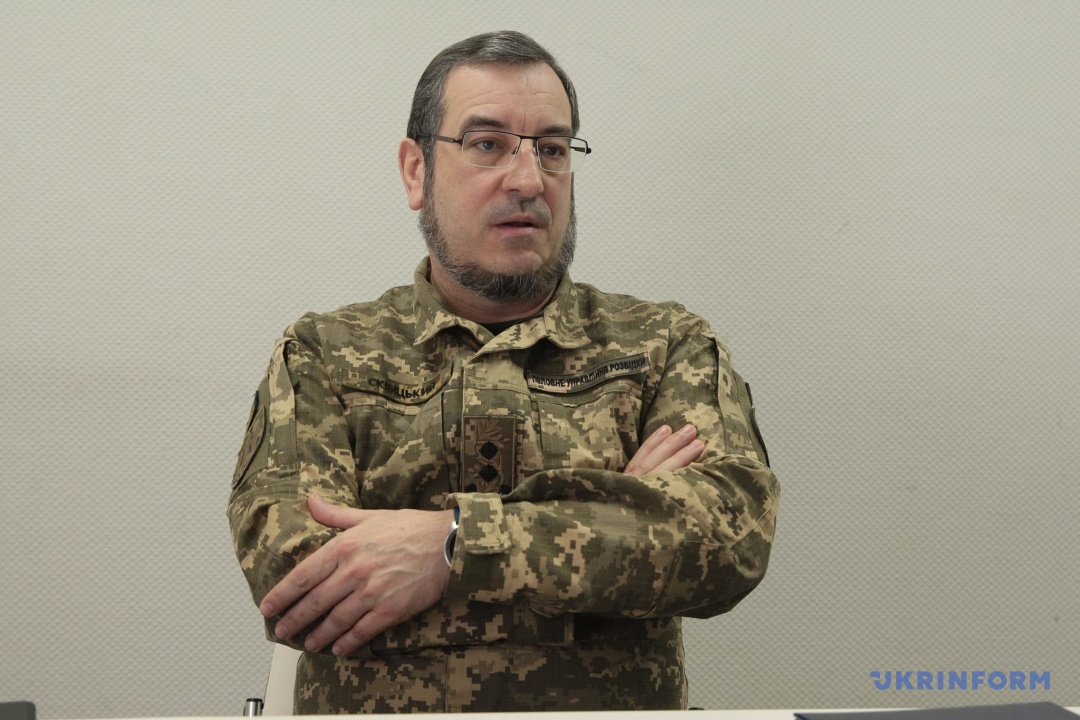
- A U.S. State Department official said that the United States is reaching out to other countries to ban Wagner from recruiting people there. What do you think about this?
- Wagner should be banned and recognized as a terrorist organization at the international level. The facts of war crimes committed by them, required for such a move, are numerous: in addition to Ukraine, this includes Syria, the Central African Republic, and other regions... (While the interview was being prepared for publication, reports appeared that the United States had recognized PMC Wagner as a terrorist organization, imposing appropriate sanctions on it. Analysts claim that this is the first concrete step towards recognizing the Russian Federation as a whole as a terrorist state - ed).
- Fresh news: in Serbia, activists went to court with a demand to ban the activities of PMC Wagner. The Americans generally want to block their recruitment efforts outside of Russia. How realistic is it to achieve such a goal?
- There is a very wide range of possible actions to neutralize such activities by Wagner – these are sanctions, this is the blocking of financial flows, this is the limitation on arms supply... And there are also international conventions on mercenaries, in many countries criminal liability for mercenary activity is laid down...
- But mercenary action is also prohibited in Russia...
- And they claim that Wagner is a private company, although they have no law that would regulate private military companies.
- Can you give an approximate amount that Russia spends on Wagner per month? How and how much are they paid? Not everyone is paid the same, probably...
- The Russian Federation will always find money for PMC Wagner. Regarding their pay and equipment, It is impossible to compare, for example, a professional Wagnerian or an instructor – their gear, training, and allowance – with that of someone whom they simply hired from a penal colony and who was killed in some two months. Russian mercenaries agree to RUB 200,000-250,000 per month.
- Is it about $3,000-3,500?
- It’s something like that. But there the gradation is very clear, management has one level of allowance, professional instructors – another, professional fighters are the third category, and the fourth is those who are now being recruited and used as cannon fodder.
- You said that they now have the task of occupying the entire Donbas. But at the same time, there is currently a lot of talk that they will launch a general offensive in the South late winter or early spring. What does intelligence know about their plans there? Are there any surprises?
- Everything will depend on the situation in Donetsk and Luhansk regions. These are related things. There may be distracting maneuvers, distracting strikes, this may be the development of the success they are counting on in the Donetsk direction. But we have enough information to analyze and determine the possible nature of enemy actions.
- And what forces have been accumulated there as of today?
- We definitely know which grouping they have, what its composition is, what weapons they have, in which settlements they are stationed. Don't worry, we have the situation under control.
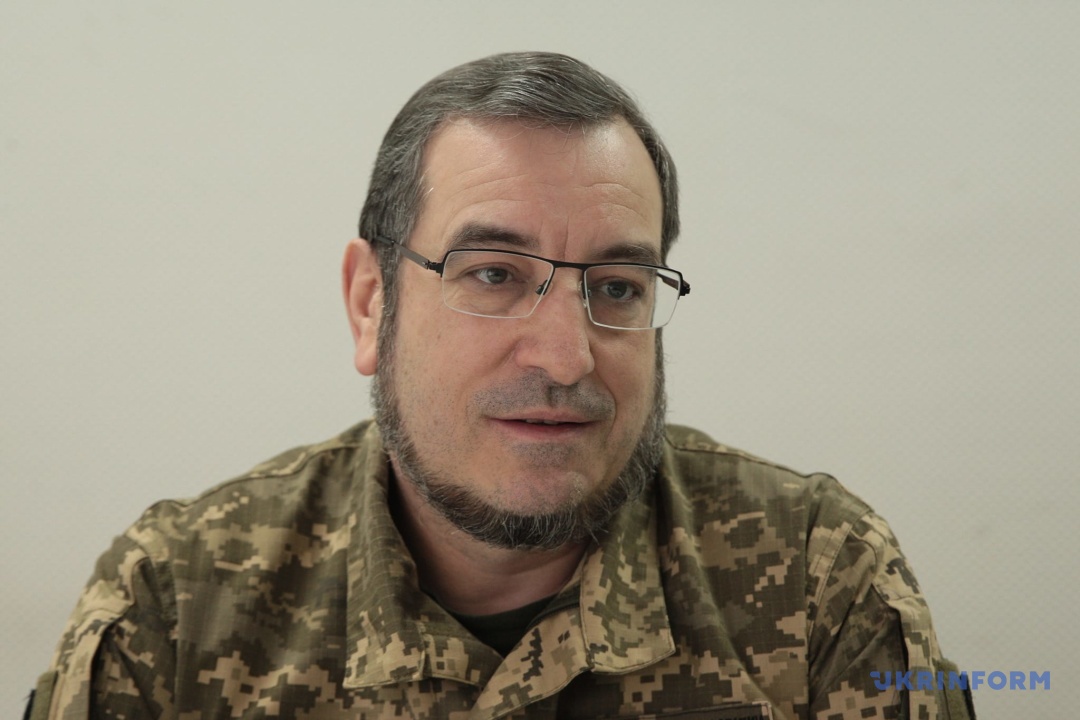
- And what about our response?
- I think we have things to respond with. Our partners are also helping us now as they understand the complexity of the situation.
- The enemy is carrying out fortification works in Crimea...
- Yes, the Kremlin is preparing for defense. The aggressor is not simply carrying out these works, the Russian command has even created a corresponding defense grouping on the territory of Crimea.
- So they will not employ all their forces during the spring offensive?
- No. Territorial troops are also being deployed there, these are divisions and regiments, not only the Crimean formation.
- Their territorial defense forces began to form earlier than ours, didn’t’ they?
- We saw their territorial defense forces during the exercises, starting in 2016. Every time at strategic exercises - "Center", "Zapad", "Vostok", "Caucasus" - they practice the deployment of territorial defense troops. In particular, two divisions of territorial defense forces were created in the occupied Crimea.
- Are they well trained?
- What do you think? If we take a reservist who served in the army 20-30 years ago, or if he served in the Soviet army in a construction battalion? Of course, the training of such reservists is unsatisfactory, and the motivation is much lower than in units of the Russian regular armed forces.
- What about the numbers?
- If it is a motorized rifle regiment, it’s 1,500-2,000 troops. We know the number of units and formations of the territorial troops in Russia. And most importantly, our General Staff has this information and takes it into account when planning our actions. We should not scare our people with these numbers: 300,000 or 500,000... There are many other factors - weapons, morale...
- And what can we say about it?
- Very easy. Those who stand on the front line do not want to fight, are unwilling to go on the offensive, many of them try to mutilate themselves or self-inflict a light wound in order not to return to the front. Most say that as soon as the contract ends, they will leave the position and go home. However, no one asks them anymore.
Many believe that there will be a rotation, but they have been talking about this rotation since April, and it is not there. Separate units are withdrawn from the front line, but this is only to replenish losses and restore. At the same time, if at the beginning they were taken to the Russian territory, now from Kherson they are simply transferred closer to Crimea – Zaliznyi Port or Skadovsk. They "recovered" there for three to four weeks and they were deployed to the front, again.
- Recently, there have been fewer "incidents" in Russia. Is it because we don't risk our people or have they protected the problem areas?
- If there are vulnerable spots, then, of course, they try to protect them, employ air defenses. But the main thing is their counter-intelligence regime, powerful censorship. We see this in the temporarily occupied territories, and even more so in Russia: the scene of the incident is immediately cordoned off, the FSB arrives, no one will enter, no one will leave, no one will get any information. But our people are working anyway, as they say... This is our enemy, it must be destroyed so that missiles are not launched at our peaceful cities and people, so that there are no repetitions of the tragedy in Dnipro... There’s this pilot in Russia who launched that missile. He must not fly again and for this act his warplane must be destroyed or put out of combat, a combat missile must be disabled in advance so that it can’t hit the target or simply explode in the air, etc. These are very complex things that require preparation, trained people, and appropriate measures. And the enemy is afraid of this – as a result, they deployed an additional S-400 division near Moscow...
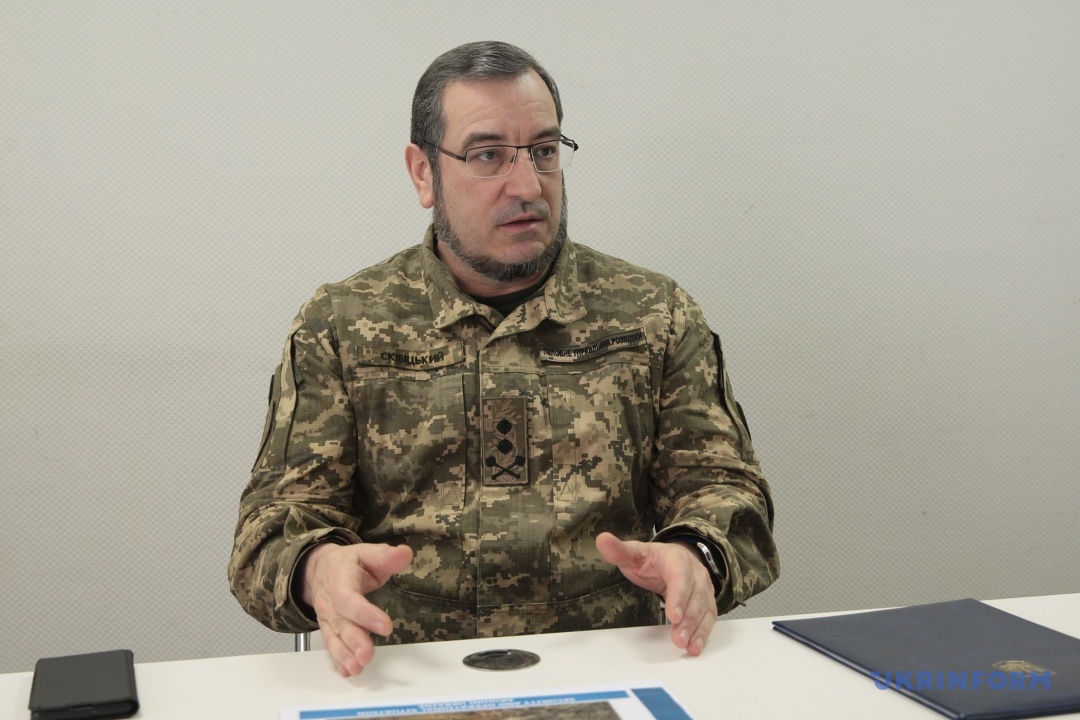
- And what measures have the Russians taken, so to speak, in the wake of those “incidents”?
- I will tell about Engels (airfield - ed.) They dispersed strategic aviation at various airfields, including the Far East. And this has an effect now, because it is one thing to fly a thousand kilometers to the missile launch line and another – to fly 5,000. That is, 5,000 there, 5,000 back... This is all their resource – the plane, the engine, the load on the crew, additional fuel consumption…
- The enemy's plan to demoralize the Ukrainian society never realized. Intelligence sees some alternative strategies that they may have, including terrorist attacks. How do you assess our ability to resist this?
- Let's take a real look at this picture, let's take the time frame from June to now. Name me at least a few high-profile terrorist attacks that were committed by the aggressor on our territory during this period, in addition to missile attacks?
- Is our counterintelligence working?
- It’s not only counterintelligence, it is our population. Believe me, in February and early March, our people took an active part in the fight against subversive groups and spies. That is, they monitored all new people in the apartment block, unusual occurrences in their neighborhood: wherever some marking appeared on the wall, on the sidewalk – people would call the hotline en masse. Our public has rallied, people understand that this is war.
Look at what happened in the territories that were temporarily under occupation. In fact, the entire nation worked to hand over information about enemy movements and actions. It was physically very difficult to process everything, it was a kind of information explosion. By the way, our partners are simply amazed that it is possible to receive such help from the public online. I answered them: this is not Afghanistan or Iraq, there were completely different conditions there and a completely different population. This is our country and we all protect it. Everyone from the military to a grandmother who lives on the first floor and sees through her window that some strangers have entered the building.
- At the same time, there are many sociological studies suggesting that military failures do not demoralize Russians, but on the contrary – consolidate them. How do intelligence operatives explain it?
- We operate facts. Yes, there is such a mood there – stand up against Ukraine, against the West, against NATO. They are already talking not about some "special operation", but about war – with the West, with NATO. After decades of brainwashing, Russians believe in all these things. It is necessary to understand the situation that has developed in the Russian Federation. Society there is completely cleansed.
- And how does Ukrainian intelligence assess the level of psychological stability of Russian society?
- That’s an interesting one. To what extent can it, this psychological stability, collapse... For this, a powerful influence is needed – not so much an informational one, but in general, some events that would serve to change the consciousness of the Russian population.
- As for the threat of a tactical nuclear strike, do intelligence agencies have means of predicting such a strike? What is known about the technical condition of the enemy's nuclear munitions?
- First of all, today the threat and in general the rhetoric of deploying nuclear weapons is not as relevant as it was in the early fall. This was facilitated by the efforts by the international community regarding nuclear security, including the reaction of the United States, China, and European countries. Second, we have been and are constantly monitoring everything related to nuclear weapons, especially before the start of a large-scale invasion. There are nuclear carriers in Crimea as well, the Russians constantly worked out the issue of delivering a nuclear warhead, preparing weapons for possible combat use. As for the technical condition, this is a tactical nuclear weapon, which was manufactured in the times of the Soviet Union. Yes, the service life was extended, but the warhead was not even tested on the Iskanders or Kalibrs. Nevertheless, everyone understands that Putin's regime has nuclear weapons and Moscow uses this as one of the elements of pressure and intimidation.
- And if everything goes bad for them, could they employ it?
- I mean, this is one of the elements of intimidation. Tactical nuclear weapons do not solve the main strategic task, so it is necessary to talk about it.
- A somewhat unexpected question. In modern warfare, unlike the wars of the past, intelligence has become much more open. Forecasts are published, interviews are given... What are the reasons for such changes?
- This is about strategic communications. We started doing it in 2015, as I remember now, my first broadcast was at the end of October 2015. At that time, many did not understand how intelligence came out with its open information to society. But everything is very simple: then it was necessary to explain that in Ukraine there’s no internal conflict, and that this is not Russia's support for "someone" in our country, this is a direct, brutal and undisguised armed aggression of the Russian Federation against our state.
In 2021, the American, British, and other intelligence communities also began to make their information public. And their message is also very simple: they convey the message that intelligence sees everything that's going on, that's the first thing. Secondly, it is a signal to the enemy, the Russian Federation, at this stage that we know about their plans. And since we are aware of them, we are preparing for their aggression. Yes, these are new approaches, but they are unequivocally effective, effective for our society as well, because when someone in the modern world does not receive information, for example, from us – military intelligence, from the Ministry of Defense, the General Staff, they look for this information through other channels. And this is where enemy propaganda and disinformation appear, in particular.
- So you have no complaints against your Western colleagues regarding their regular reports that they have learned about the war in Ukraine?
- Why should we have them? We pursue cooperation with them, they have their strategic communications, we have ours. Somewhere, at the expense of this, we even compare plans and conclusions: what they know, how they evaluate things. We have become more transparent and understandable, although we have our secrets, our mechanisms.
- At the beginning of 2023, we heard at least three forecasts of our major offensive and the final turning point in the war: March, May, and August. And in your opinion, when could this happen?
- I told you the forecast for the next two months, it is real. It is still too early to talk about a complete turning point in the war today, but there are signs that the situation will change. 2023 is the year of our Victory. Our Victory is already about the fact that we have been defending our independence for almost a year in a war with a nuclear state that has greater mobilization and economic potential. This is already a strategic defeat for Russia, of which not only we are talking, but also the whole civilized world.
- We already have the title: 2023 is the year of Victory.
- That's right, even here, we are talking not only about victory on the battlefield, but also about victory in all other directions: such a powerful coalition of states, which supports Ukraine now, has never existed in the entire recent history of our country. This is already a victory.
- But probably in the entire history of mankind, there was no such support from other states for a state that was subjected to brutal aggression...
- The history of mankind is one thing... But let's go back to the 1918-1921. Who recognized Ukraine as an independent state back then, who supported it in the fight against the Moscow invasion? And now, after 100 years, what do we see? This is what our Victory is about today.
Serhiy Tykhy, Kyiv
